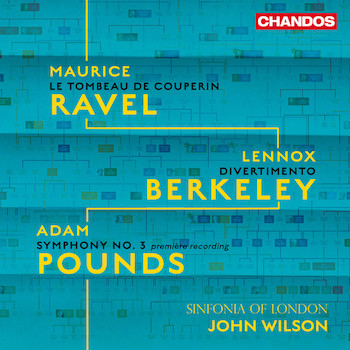Classical Album Reviews: The Sinfonia of London and Susanna Mälkki with the Helsinki Philharmonic Orchestra
By Jonathan Blumhofer
The Sinfonia of London and Susanna Mälkki with the Helsinki Philharmonic Orchestra release recordings filled with color and beauty.
 Though the Sinfonia of London was originally founded in 1955, it was disbanded twice before conductor John Wilson resurrected the name, at least, as an ensemble dedicated to making recordings in 2018. They’ve been busy ever since: the group’s latest disc is its 17th and it’s typically unusual, pairing Maurice Ravel’s Le Tombeau de Couperin, Lennox Berkeley’s Divertimento, and Adam Pounds’s Symphony No. 3.
Though the Sinfonia of London was originally founded in 1955, it was disbanded twice before conductor John Wilson resurrected the name, at least, as an ensemble dedicated to making recordings in 2018. They’ve been busy ever since: the group’s latest disc is its 17th and it’s typically unusual, pairing Maurice Ravel’s Le Tombeau de Couperin, Lennox Berkeley’s Divertimento, and Adam Pounds’s Symphony No. 3.
The latter is, essentially, a pandemic symphony, written during the height of the global crisis; its echoes of Shostakovich, Vaughan Williams, and Prokofiev ensure it sounds plenty familiar. Yet Pounds’s writing is anything but derivative. Rather, throughout he demonstrates a strong sense of musical character and shape, as well as a keen ear for instrumental sonorities and command of thematic development.
Wilson and the Sinfonia, for whom the score was written, play it with a real feeling of ownership. The woodwind writing, in particular, shines and the score’s several stormy, intense sections drive powerfully. But it’s the Symphony’s third-movement Elegy – noble, serene, spacious — that stands as the work’s high point: music decidedly of the present but tapping a vein of timeless, unaffected beauty and pure expression.
Ravel’s Tombeau does a similar thing, though from the vantage point of the early 1920s. What’s more, his nods to the music of François Couperin offer no shortage of opportunities for an orchestra to display its technical discretion and prowess.
Accordingly, the Sinfonia has a ball with it. The outer movements are beautifully balanced and fluent, while the Menuet dances with graceful radiance. Though the Forlane sometimes feels a shade dry and literal, Wilson’s lively tempos and the orchestra’s precise rhythms and textures ultimately carry the day.
The pairing also makes the most of Berkeley’s witty Divertimento. Written in 1943, it’s music that largely ignores the events of its time (something that can’t be said of either of its companions on this release).
Regardless, Wilson and the Sinfonia invest its biting rhythms and puckish energy with plenty of crispness. But they don’t stint in the music’s more reflective spots: the Nocturne’s pungent harmonies and lyrical tunes are smartly shaped. And the Scherzo’s shadowy turns shimmer with mystery.
 Susanna Mälkki’s discography with the Helsinki Philharmonic Orchestra (HPO) has, thus far, veered in the direction of Béla Bartók. Their latest offering, though, changes course pretty dramatically, showcasing a trilogy of suites by Jean Sibelius.
Susanna Mälkki’s discography with the Helsinki Philharmonic Orchestra (HPO) has, thus far, veered in the direction of Béla Bartók. Their latest offering, though, changes course pretty dramatically, showcasing a trilogy of suites by Jean Sibelius.
The biggest one of those is the Lemminkäinen Suite, a mid-1890s score that depicts various scenes from the life of the hero of Finnish mythology. Unsurprisingly, Mälkki and her forces infuse its four movements with color and life.
“Lemminkäinen and the Maidens of the Island,” for instance, boasts playing that’s both consistently well-balanced and wonderfully flexible. As a result, Mälkki cuts through its dense layers of thematic and rhythmic content; indeed, they sing and dance with becoming clarity.
In the central movements, she presides over a hypnotic, plaintive account of “The Swan of Tuonela” and forcefully draws out the elemental qualities of “Lemminkäinen in Tuonela”; rarely does the latter unfold with such organic logic. In this context, “Lemminkäinen’s Return” stands as a limber, invigorating romp.
Mälkki and the HPO bring a similar attention to detail to Rakastava, Sibelius’s strange 1912 essay for strings and percussion. Here, the ensemble’s lean textures and searching energy culminate in a discreetly dovetailed yet impressively tight reading of the concluding “Good night!…Farewell!”
Less fraught is the Karelia Suite. Under Mälkki’s guidance, the outer movements of this 1893 favorite snap with muscular spirit, especially the swaggering final march. In between comes a warm, floating Ballade, among whose highlights count an attractively limpid oboe solo just before the end.
Jonathan Blumhofer is a composer and violist who has been active in the greater Boston area since 2004. His music has received numerous awards and been performed by various ensembles, including the American Composers Orchestra, Kiev Philharmonic, Camerata Chicago, Xanthos Ensemble, and Juventas New Music Group. Since receiving his doctorate from Boston University in 2010, Jon has taught at Clark University, Worcester Polytechnic Institute, and online for the University of Phoenix, in addition to writing music criticism for the Worcester Telegram & Gazette.
Tagged: Bis, Chandos, Helsinki Philharmonic Orchestra, John Wilson, Sinfonia of London
